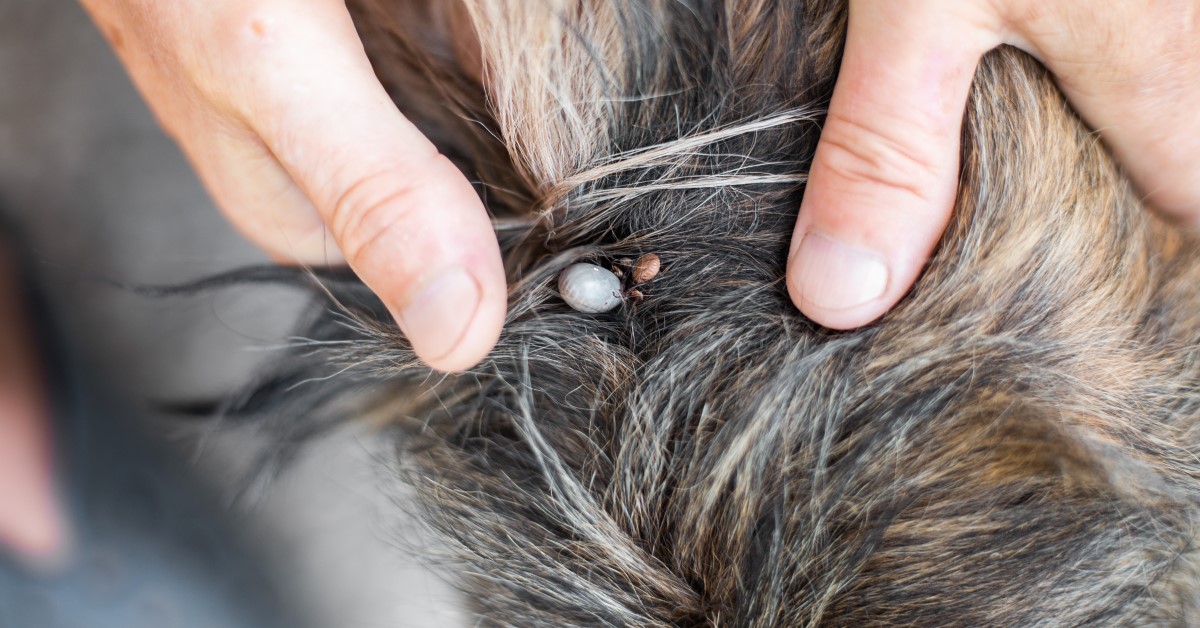Treatment and Prevention of Parasites in Dogs
Routine veterinary care and smart home practices can protect your dog against parasites.

Dogs will be dogs, and that's part of their charm. Your pooch probably enjoys rooting around in public parks, roaming through underbrush, and drinking out of random water puddles. Unfortunately, these fun activities can expose your pet to many kinds of parasites, from visible bugs to ingested eggs that then blossom into dangerous worms. Let's examine what kinds of threats these parasites can pose, how veterinarians treat parasitic infestations in dogs, and what kinds of canine parasite prevention techniques you can employ around your home.
The Worrying World of Dog Parasites
Parasites seem to surround us and our pets. You'll want to protect your pooch against both external and internal parasites.
External Parasites in Dogs
Fleas, ticks, and mites all count as external dog parasites. These creatures cause itching and irritation, prompting dogs to scratch at their skin until infections form. They can also cause health issues more directly. Flea and tick bites can transmit a variety of disease, while mites commonly cause the skin lesions and hair loss associated with mange.
Internal and Intestinal Parasites in Dogs
When people talk about dogs having worms, they're referring to a common category of intestinal parasite. Examples include hookworms, pinworms, tapeworms, roundworms, and wheelworms. Dogs commonly ingest these worms through exposure to tainted water, soil, or animal feces. In the case of hookworms, the parasites can even enter through the skin of the paws. These worms usually attack the digestive system, causing diarrhea, vomiting, malnutrition, and (in puppies) stunted growth.
Heartworm infestations can prove especially devastating to dogs. These worms invade a dog's bloodstream via mosquito bites. As they mature into long, spaghetti-like worms, they inhabit the heart and lungs, eventually causing those organs to fail.
Some internal parasites take the form of waterborne microorganisms. If your dog drinks contaminated water or has water invade a break in the skin, a serious digestive disease such as giardiasis, leptospirosis, or cryptosporidiosis may result. These diseases tend to produce symptoms such as diarrhea, vomiting, fever, gas, lethargy, and/or abdominal bloating.
Parasite Prevention Tips for Dog Owners
Fortunately, you can dramatically reduce your dog's exposure to external and internal parasites by adopting some common-sense preventative measures, both at home and around the house. Take a look at some of the tactics you can employ.
- Skin inspections - Cuddle time with your dog gives you a chance to feel the fur and inspect the skin for any signs of flea, tick, or mite problems. With any luck, you can wash these pests away before they can cause trouble. Skin lesions should prompt you to schedule a veterinary evaluation.
- Household hygiene - Don't let parasites and their eggs take up residence in your home. Vacuum your carpets, upholstery, and pet bedding regularly, disposing of the vacuum bag after every use.
- Outdoor parasite prevention - Maintain a parasite-unfriendly yard by trimming your grass, which deprives fleas and ticks of their preferred environment. Cover or remove bird feeders and other sources that might foster mosquitos. Clean your yard of animal poop regularly.
Crucial Parasite Treatment from Your Veterinarian
You're not alone in the fight to protect your beloved dog against parasites. Veterinarians can help your four-legged friend enjoy parasite-free life by administering preventative care. In the case of an active infestation, they can provide effective treatment for dog parasites.
Routine annual wellness exams allow your vet to catch all kinds of potential or actual health crises, including parasitic infestations in dogs. Fecal samples can reveal the presence of heartworms or digestive worms, while other lab tests can help diagnose any diseases, symptoms, or complications caused by parasites. A skin exam will confirm any flea, tick, or mite problems that need addressing. The sooner these problems are caught, the more easily they can be treated and the more quickly your dog will feel better.
Preventative medications help your dog steer clear of parasitic infestations and expensive treatments. These medications typically take the form of chews or pills that you feed to your dog like clockwork once a month. Some of these preventatives guard against several types of external and internal parasites, removing multiple threats simultaneously. Just make sure you don't skip or forget a dose, since even a small gap in protection could open the door to an infestation.
How to Treat Parasites in Dogs
Parasitic infestations in dogs can respond to prompt, skilled veterinary treatment. One common example involves deworming. Vets typically check puppies for worms and administer drugs as needed to clear out any internal parasites that they may have "inherited" at birth or received through their mother's milk. Your puppy should receive the first of these exams and treatments at around two weeks of age, with the regimen continuing until the puppy is completely weaned.
Even if your dog develops heartworm, treatment techniques can eventually restore it to health. You should know, however, that the treatment process can prove a long and difficult one, with two different medications administered months apart. You can spare your dog this ordeal by simply giving it the monthly preventative drugs mentioned above -- an easy routine well worth adopting.
As for external infestations, medicated shampoos can help rid your dog of fleas, ticks, and mites. Once you've evicted the bugs, you can keep them off your pet through preventative medication.
Don't let parasites thrive at the expense of your dog. Talk to your veterinarian about setting up a comprehensive canine parasite prevention plan!
Ready to start saving money on pet wellness care?
Then take a look at Mint Wellness, the pet wellness plan that provides fast reimbursement on routine pet care. Save on vaccinations, wellness exams, preventatives, dental, and more!
Learn More


